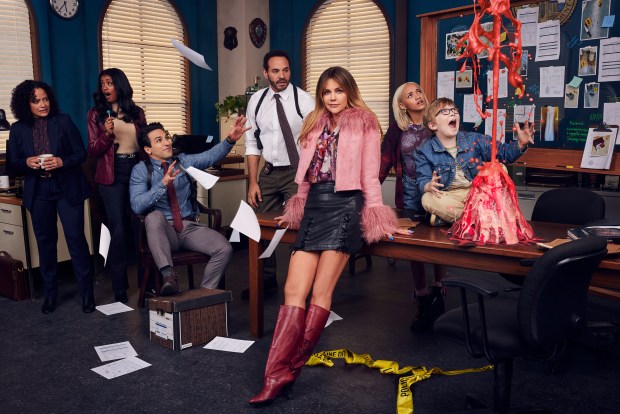A crime occurs. The cops are stumped. If only they had the services of a colorful outside investigator to solve their case. A common subgenre of the police procedural, “High Potential” on ABC suggests the limits of this premise. Whether mildly theatrical or even absurd, the character needs to be more than their quirks. I wonder if Hollywood has taken the wrong lesson from these kinds of ungovernable fictional creations first embodied in the stories of Sherlock Holmes and Hercule Poirot.
I’m desperate for the re-ascendance of old-school weekly broadcast shows — something, anything that distinguishes itself from the eight shows on offer from Dick Wolf across two networks — and “High Potential” (from Drew Goddard, whose credits include “Buffy the Vampire Slayer,” “Alias” and “Lost”) starts off well enough.
Kaitlin Olson plays Morgan, a single mom who works the graveyard shift cleaning the offices of the Los Angeles Police Department. Dancing to music on her headphones, she accidentally knocks over a pile of crime scene photos and starts rifling through them. She’s transfixed. Then she looks over at the murder board. She walks up, grabs a marker, crosses out “suspect” under someone’s photo and writes “victim.”
Then she goes on with her night.
It’s such a tantalizing opening sequence (and a beat-for-beat recreation of the French series it’s adapted from) but strangely the show deflates from there. It’s quickly discovered that the cleaning woman — yes, that one, with the garish taste in fashion and loud mouth — has some helpful ideas about the case. She’s clever, with a good memory and a mind that sees patterns and makes connections, so she’s hired full-time, becoming the Erin Brockovich of police procedurals. The lieutenant (Judy Reyes, wasted in a nothing role) teams Morgan with a guy named Detective Karadec (Daniel Sunjata) who becomes her reluctant chaperone.
Olson is a good actor, but there’s not much versatility here; her line readings could just as easily come from the mouths of characters she plays on “It’s Always Sunny in Philadelphia” or “Hacks.” Morgan is a handful, with a chip on her shoulder, often tipping over into obnoxious. That works on Olson’s other shows, but “High Potential” needs its lead to be at least somewhat likable. In the first episode, she berates a cashier at the grocery store; the moment doesn’t illustrate her ability to do math in her head, it just makes her look like a person who takes her frustrations out on an easy target, aka someone who is working class like herself.
The show’s obvious touchpoints are long-running series like “Castle,” “Monk,” “The Mentalist,” or, more recently, “Elsbeth” and “The Irrational.” The cops are incapable of doing their jobs without the help of a dogged oddball whose unwieldiness requires a certain amount of corralling from their police minders. That framework is a lackluster substitute for Poirot’s Hastings or Sherlock’s Watson, who weren’t professional acquaintances but actual friends and point-of-view characters who threaded the needle between admiration for their counterparts and pausing to note their more absurd or annoying personality ticks. It’s one reason why CBS’s “Elementary” was a cut above the rest.
“High Potential” struggles to ground itself in solid storytelling and create fully realized characters, even when they are one-offs. A case-of-the-week structure requires a specific skill and I worry writers are out of practice: Establishing a new storyline and new characters each time, with enough detail and care to get buy-in from the audience, and then resolving the mystery 40-some minutes later. Episodes should be able to stand alone as crackerjack short stories, but the results here are thin and insubstantial.
That would be easier to overlook if there were some chemistry in the central dynamic. Morgan is brash and curious and obsessive. That’s good. But she’s spent her life underestimated by everyone and we don’t get a sense of what it means to have a job that’s fulfilling, pays well and finally validates her intellect. Instead she comes across as a snarky sitcom character— even when talking about murder — whereas Detective Karadec is wooden, macho and often on the verge of popping a vein or two. This pairing of opposites doesn’t create sparks so much as a repetitive cycle. She’s smug. He’s frustrated. That gets tiring awfully quick. That they will learn to grudgingly respect one another doesn’t delight the way it should. Better writing and better performance choices — more nuance, fewer archetypes — would go a long way.
“These are laws! Principles that I devoted my entire life to protecting!” Karadec yells after Morgan has obtained evidence through theft. Earnest outrage is certainly one way to play the scene. If he had said it deadpan, suggesting that police have a far more fluid concept of professional ethics, well, then you’d be cooking with gas.
“High Potential” — 2 stars (out of 4)
Where to watch: 9 p.m. Tuesdays on ABC
Nina Metz is a Tribune critic



